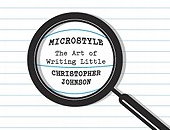Are You A Master of Brevity Yet?
Author Christopher Johnson’s new book Microstyle: The Art of Writing Little highlights the best ways to get messages noticed, remembered, and passed along. “Brevity is just a minimal requirement,” he says.
Topics
In Microstyle: The Art of Writing Little (W. W. Norton & Company, 2011), author Christopher Johnson states his premise from the first sentence of the introduction: “This is the age of the Incredible Shrinking Message.” He continues:
“Some of the most important verbal messages we encounter are also the shortest. Headlines, titles, brand names, domain names, sound bites, slogans, taglines, catchphrases, email subject lines, text messages, elevator pitches, bullet points, tweets, and Facebook status updates are a few examples.”
“The function of microstyle is to get messages noticed, remembered, and passed along,” Johnson writes. “Brevity is just a minimal requirement.”

Johnson synthesizes “a wide range of current thinking from recent books about grammar, branding, cognitive science and Web theory” with “intelligence and friendly wit” says a New York Times book review. “His book is here, like a dating guide, to whisper: You too can woo.”
One piece of advice (from page 216): Create a “microvoice,” a voice that “implies an attitude or even a whole persona.” As Johnson writes: “To participate in the web conversation, it’s crucial to use language to create a voice. When you add a comment to a blog or contribute to an online forum, unless you’re a familiar contributor, with a reputation, you’ll be making a personal impression based entirely on your use of language.”
Some of Johnson’s themes echo work we’ve written about here. Recent research by MIT’s Sinan Aral, Erik Brynjolfsson and Marshall Van Alstyne found that people who send short e-mails are likely to get responses more quickly than those who send longer, less focused ones — important, since getting faster responses translates into better productivity. Our blog post “





Comments (5)
Steven Weiss
Ricky Smitters
J Brayton
Jon Harvey
Andrew McFarland